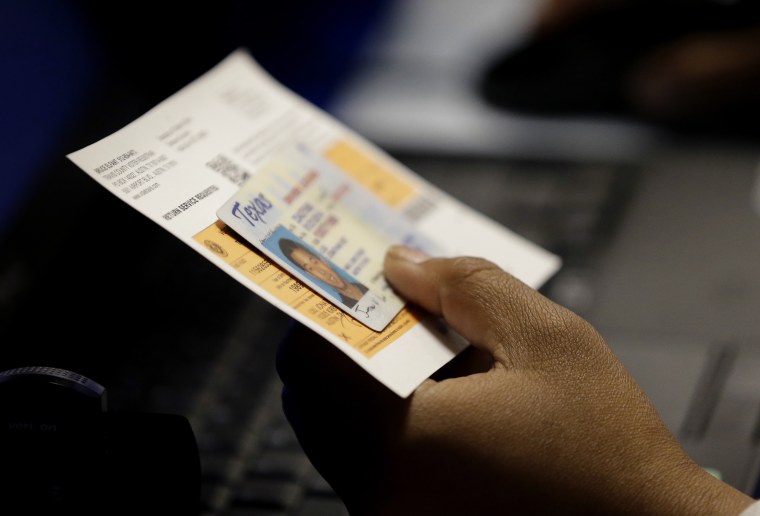After conservatives on the U.S. Supreme Court gutted the Voting Rights Act, Texas Republicans wasted no time imposing some of the nation's harshest voting restrictions. And when I say "wasted no time," I mean that quite literally -- GOP state officials acted within hours of the high court ruling to suppress Texans' ability to vote.
At the heart of the campaign is the Lone Star State's voter-ID law -- one of the nation's most ridiculous -- which has had the practical effect of disenfranchising
hundreds of thousands of Texas voters. Today, as the Associated Press
reported, that law was struck down by a federal appeals court.
The 5th U.S. Circuit Court of Appeals in New Orleans said Wednesday that the Texas law, one of the toughest voter ID measures in the country, violates Section 2 of the [Voting Rights Act]. The U.S. Justice Department had joined minority groups in a drawn-out legal battle that has stretched for years. A lower court had previously found that the voter ID was passed by the Republican-controlled Texas Legislature with the intent of discriminating against minorities. But in striking down the law, the appeals court did not find the voter ID requirement to be the equivalent of a poll tax.
Rick Hasen posted the text of the 5th Circuit's ruling, which was unanimous, online
here (pdf). Note, the ruling's author was appointed to the bench by George W. Bush, which makes it a little tougher for the right to see this as evidence of liberal judicial activism.
So, is Texas' odious law no more? Not quite. As Hasen
explained, this is "a great (but not complete) victory" for voting advocates. From his Election Law Blog piece:
The court affirms that the law violates Section 2 of the Voting Rights Act, but rejects the claim of discriminatory purpose and that the law constitutes a poll tax. The court remands for more findings on discriminatory purpose and for a decision on the remedy to the Section 2 violation. That remedy could allow Texas to keep enforcing its law for most people, so long as it gives ways to vote for those who face burdens under the law. This is a narrow but important victory coming on the eve of the 50th anniversary of the passage of the Voting Rights Act.
ThinkProgress' Ian Millhiser
added, "Though the court did not accept every argument raised against the state's voter ID law, and its opinion does not go nearly as far as a trial judge's decision which also struck down this law, it is a significant blow to the state's efforts to make voting more difficult."
At a minimum, Millhiser reported, we can expect to see the Texas law "significantly weakened."
